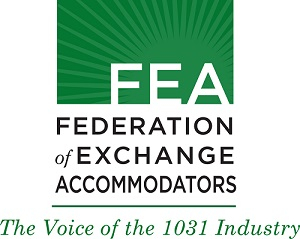BLOG
FEA calls Federal regulation of Exchange Facilitators in financial reform bill a good start

Industry's only trade association supports strong regulation, looks forward to working with Consumer Financial Protection Bureau to craft consumer protection measures
President Obama is slated to sign the Consumer Financial Protection Act of 2010 (CFPA) into law in the coming days, and the Federation of Exchange Accommodators (FEA) believes the move is an important first step toward assuring comprehensive protection for all consumers. The FEA, the trade association representing the exchange facilitator industry, says it looks forward to working with the Consumer Financial Protection Bureau to develop regulations governing exchange facilitators, also known as Qualified Intermediaries, who facilitate tax-deferred exchange transactions under Internal Revenue Code (IRC). The comprehensive set of tax laws created by the Internal Revenue Service (IRS). This code was enacted as Title 26 of the United States Code by Congress, and is sometimes also referred to as the Internal Revenue Title. The code is organized according to topic, and covers all relevant rules pertaining to income, gift, estate, sales, payroll and excise taxes. Internal Revenue Code §1031. Regulations are needed especially with respect to the security of client funds.
The CFPA will include a provision requiring the Director of the Consumer Financial Protection Bureau to conduct a study and propose legislation and/or regulations to protect consumers using exchange facilitators. The study and recommendations must be completed with one year after the new law takes effect, and a program or proposed regulations must be implemented within two years after the Director's report.
"This is a great beginning. However, there is much more work to be done to achieve our goal of comprehensive federal regulation that will cover all exchange clients and transactions," stated FEA President David Gorenberg. "The FEA has previously communicated to legislators our support for this bill along with our technical concerns that many transactions will not fit the definitional scope of the CFPA. We are looking forward to working with the Director and the legislative sponsors to identify and suggest regulations or legislation that will not be limited to transactions solely involving individuals engaged in exchanges for 'personal, family or household use,'" echoed Suzanne Goldstein Baker, chairperson of the FEA's Federal Legislative Committee. "The FEA intends to work with the Director to ensure that all taxpayers, regardless of whether they are individuals or business entities, benefit from mandatory protections," added Mr. Gorenberg.
The FEA has been a strong supporter of federal regulation of its industry to require prudent funds management standards and other protections for its clients. In 2007 the FEA petitioned the FTC for regulatory oversight and submitted to it a comprehensive draft regulation. The FTC denied the petition, concluding that there was no evidence of pervasive fraud throughout the industry and thus, the burdens of regulation would outweigh the potential benefits. The FEA has since been actively involved in passing state legislation to regulate exchange facilitators. The FEA drafted a "model law" which the states of California, Colorado, Maine, Nevada, Oregon, Virginia and Washington have adopted with slight variations. The FEA has also submitted to the Secretary of the Treasury and the Internal Revenue Service a proposed amendment to Treasury Regulations which would impose reasonable, understandable standards of prudent funds management requiring that funds held by Qualified Intermediaries be invested in a manner that maintains liquidity and preserves principal.
About the FEA
The Federation of Exchange Same as intermediary, facilitator, or Qualified Intermediary. The party who facilitates a tax-deferred exchange by acquiring and selling property in an exchange to aid the taxpayer in complying with Section 1031 and all applicable rules. Accommodator s (FEA) is the industry association for exchange facilitators. FEA member companies facilitate tax-deferred exchanges of investment and business use properties under IRC §1031 for taxpayers of all sizes, from individuals of modest means to high net worth taxpayers and business entities. Members range from small, privately held businesses to large, publicly traded companies and banks. Transactions range from less than $100,000 to hundreds of millions of dollars involving commercial and residential real estate, aircraft, trucks, trailers, containers, railcars, heavy equipment and other assets. To comply with tax rules, exchange facilitators typically hold proceeds from the sale of relinquished assets until they can be reinvested in replacement assets to complete the exchange. Section 1031 exchanges must be completed within 180 days. More information is available on the FEA's website, 1031.org.
CONTACT
Caitlin Middleton, Executive Director
Federation of Exchange Same as intermediary, facilitator, or Qualified Intermediary. The party who facilitates a tax-deferred exchange by acquiring and selling property in an exchange to aid the taxpayer in complying with Section 1031 and all applicable rules. Accommodator s
100 N. 20th St., 4th FL
Philadelphia, PA 19103
(215) 564-3484
cmiddleton@fernley.com
www.1031.org
